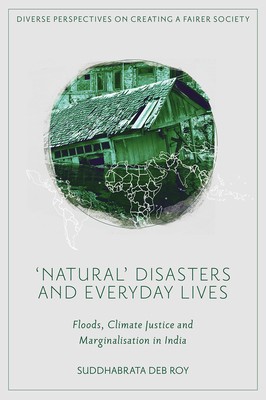
- We will send in 10–14 business days.
- Author: Suddhabrata Deb Roy
- Publisher: Emerald Publishing Limited
- ISBN-10: 1837978549
- ISBN-13: 9781837978540
- Format: 15.2 x 22.9 x 1.3 cm, kieti viršeliai
- Language: English
- SAVE -10% with code: EXTRA
Reviews
Description
Disasters have a widescale impact with drastic consequences on human lives, especially those who are marginalised by the wider society. Proposing a fresh approach towards analysing the politics of disasters, climate change and climate justice, 'Natural' Disasters and Everyday Lives explores the relationship between citizens, the State and the society in the context of the Global South's highly underdeveloped areas.
Drawing on both theoretical frameworks and lived experience, this is the first book to document the lives of people affected by floods in the Barak Valley, a flood prone area in Southern Assam, which is also one of the most underdeveloped regions of South Asia. Narrating the fear and perils of living in an underdeveloped area in India during natural disasters, Suddhabrata Deb Roy draws from interviews conducted in Silchar, the largest and most developed urban settlement in the Barak Valley, during the floods of 2022 - the worst flood in the region in over 100 years - and during 2024 to expose the processes through which the people of the region suffer from developmental negligence and socio-political apathy. Examining the intersections of natural disasters and marginality, the author relates Marx's ideas on humanism, nature, alienation and economic development to ideas around climate justice, marginalisation and urbanisation, taking into context the contradictions posed by factors such as class, caste, gender and race in highly underdeveloped regions in India.
Recognising that these issues are addressed quite differently in the Global North, Deb Roy connects flooding in northeastern India to the context of the broader politics surrounding climate change and climate justice in the Global South, making this book important and powerful reading for countering today's climate emergency.
EXTRA 10 % discount with code: EXTRA
The promotion ends in 23d.06:38:36
The discount code is valid when purchasing from 10 €. Discounts do not stack.
- Author: Suddhabrata Deb Roy
- Publisher: Emerald Publishing Limited
- ISBN-10: 1837978549
- ISBN-13: 9781837978540
- Format: 15.2 x 22.9 x 1.3 cm, kieti viršeliai
- Language: English English
Disasters have a widescale impact with drastic consequences on human lives, especially those who are marginalised by the wider society. Proposing a fresh approach towards analysing the politics of disasters, climate change and climate justice, 'Natural' Disasters and Everyday Lives explores the relationship between citizens, the State and the society in the context of the Global South's highly underdeveloped areas.
Drawing on both theoretical frameworks and lived experience, this is the first book to document the lives of people affected by floods in the Barak Valley, a flood prone area in Southern Assam, which is also one of the most underdeveloped regions of South Asia. Narrating the fear and perils of living in an underdeveloped area in India during natural disasters, Suddhabrata Deb Roy draws from interviews conducted in Silchar, the largest and most developed urban settlement in the Barak Valley, during the floods of 2022 - the worst flood in the region in over 100 years - and during 2024 to expose the processes through which the people of the region suffer from developmental negligence and socio-political apathy. Examining the intersections of natural disasters and marginality, the author relates Marx's ideas on humanism, nature, alienation and economic development to ideas around climate justice, marginalisation and urbanisation, taking into context the contradictions posed by factors such as class, caste, gender and race in highly underdeveloped regions in India.
Recognising that these issues are addressed quite differently in the Global North, Deb Roy connects flooding in northeastern India to the context of the broader politics surrounding climate change and climate justice in the Global South, making this book important and powerful reading for countering today's climate emergency.


Reviews